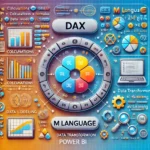BigQuery vs MySQL: Navigating Data Warehousing and Relational Databases
In the realm of data management and storage, two giants stand tall: BigQuery and MySQL. As the importance of data-driven decisions grows, discerning the nuances of these platforms becomes crucial. In this blog post, we’ll embark on a journey to unravel the core characteristics of BigQuery and MySQL, assisting you in making an informed decision tailored to your data requirements.
Unveiling BigQuery and MySQL
BigQuery: At the forefront of Google’s offerings, BigQuery takes center stage as a fully-managed, serverless data warehousing and analytics platform. Engineered to handle extensive datasets and execute complex queries, BigQuery utilizes distributed architecture for accelerated processing. Seamlessly integrated into the Google Cloud ecosystem, it’s a magnet for organizations seeking profound data insights.
MySQL: Contrastingly, MySQL emerges as an open-source relational database management system (RDBMS), revered for structured data storage. Its adaptability, robustness, and widespread adoption make it a preferred choice for a spectrum of applications, from websites to enterprise solutions.
https://synapsefabric.com/2023/08/18/bigquery-vs-cloud-sql-navigating-data-warehousing-and-managed-databases/
Feature Comparison
Let’s embark on a head-to-head comparison between BigQuery and MySQL:
| Aspect | BigQuery | MySQL |
|---|---|---|
| Use Case | Ideal for analyzing extensive datasets via queries. | Suited for structured data storage and retrieval. |
| Data Structure | Handles structured, semi-structured, and nested data. | Proficient with structured relational data. |
| Query Language | Leverages SQL dialect for queries and analysis. | Utilizes SQL for relational database operations. |
| Scalability | Auto-scales for large analytical queries. | Requires manual scaling for growing demands. |
| Performance | Excels in processing complex, large-scale queries. | Offers reliable performance for relational data. |
| Cost Structure | Usage-based model with query and storage costs. | Reduced operational costs due to open-source nature. |
| User Experience | User-friendly interface, analyst-centric. | Requires familiarity with database management. |
| Integration | Seamlessly integrates with Google Cloud services. | Adaptable integration in various environments. |
| Replication | Supports table-level streaming and batch exports. | Provides replication options for availability. |
| Security | Robust access controls and encryption features. | Employs security mechanisms for data protection. |
| Community | Part of the extensive Google Cloud ecosystem. | Flourishing open-source community of developers. |
Making an Informed Decision
Choosing between BigQuery and MySQL rests on your organization’s specific demands:
BigQuery caters to those dealing with large datasets, aiming for insightful data analysis through swift queries and extensive exploration.
MySQL appeals to those seeking a dependable relational database solution for structured data storage and retrieval, particularly for applications like websites and enterprise systems.
Conclusion
BigQuery and MySQL are stalwarts in their respective domains, addressing diverse data challenges. Your decision should align with the nature of your data, the complexity of your queries, and your team’s proficiency. Equipped with insights into both platforms, you’re empowered to make a calculated choice that resonates with your data management and analysis ambitions.






